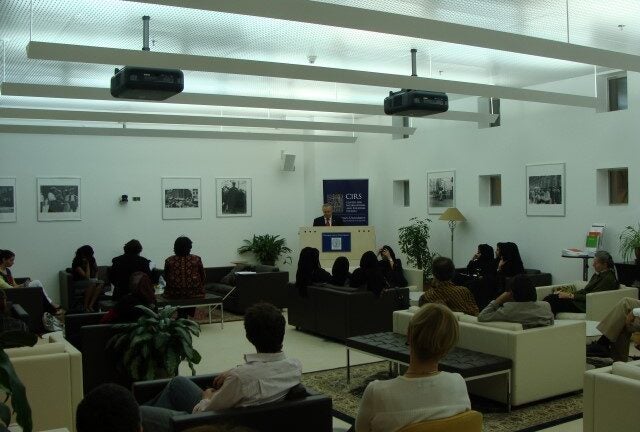Dialogue Series, Distingushed Lectures, Regional Studies
Commemoration of Mahmoud Darwish

In honor of the memory of Palestinian Poet Mahmoud Darwish, CIRS hosted a literary evening to recall his life and his legacy. His Excellency, the Palestinian Ambassador to Qatar, Munir Ghannam, and Georgetown University Professor, Amira El Zein, were invited to share their thoughts on different aspects of the poet’s life and work. Ambassador Ghannam recounted Darwish’s biography from birth to death and El Zein, professor of Arabic, engaged with his art, speaking of the powerful metaphorical nature of his poetry. Drawn by the culturally binding subject of poetry, the audience was an eclectic mix of students, faculty, embassy staff, and poetry-lovers. The audience was treated to rare insights into Darwish’s life as both speakers relayed anecdotes about meeting the poet, conversing with him, and relaying what he meant to them as a personal friend.As an introduction to his talk, Ambassador Ghannam began by lamenting the loss of not only a great poet, but of “the voice of Palestinian resistance.” He recounted to the audience several episodes in the life of Mahmoud Darwish: how he was born in a land called Palestine that is no longer in existence; how he and his family were driven away from their homes by Israeli occupiers; how he was arrested on numerous occasions because of his inflammatory writings; how he went into exile to Russia, France, the United States, and Egypt; and how he returned and became actively involved in the politics of Palestine. Ambassador Ghannam spoke of the social, political, and economic struggles of the Israeli-Palestinian conflict and how the realities and hardships of Darwish’s life figured prominently in his work as he translated his personal experience into poetry.
Ambassador Ghannam gave a bi-lingual recitation of some of the verses of Darwish’s famous poem “Identity Card,” which is believed to have defined Palestinian identity through language and, which became a symbol of Palestinian resistance. Over the years, Darwish gained a reputation as a leading voice of protest and became known as the national poet of Palestine. He even lent his words to the Palestinian cause by penning a famous speech delivered by Yasser Arafat at the United Nations and by wording the Palestinian Declaration of Independence. Darwish’s work, Ambassador Ghannam concluded, has been translated into many languages and several of his poems have crossed artistic disciplines and have been set to music by Marcel Khalife, making them popular to a wider audience.
Georgetown University Professor Amira El Zein concentrated on the metaphorical nature of Darwish’s work. In most of his poems, El Zein said, Darwish acknowledged the native American use of the “name” and the metaphor of home to give identity to, and keep alive, a home long gone. She argued that everything exists in language and so to keep the idea of home alive in language is to also keep the idea of returning to that home alive. El Zein quoted Darwish as saying “because I couldn’t find my home in the land, I found it in history.”
Language, El Zein said, does not mirror the world, but rather, Darwish created Palestine through poetry and that is why his use of language is such a powerful socio-political tool. The foundation of Israel not only appropriates the land, but perhaps more importantly, the histories, mythologies, and identities of the Palestinian people. All these elements of existential strife are interwoven through the poetic devices of Darwish’s work. El Zein concluded by telling the audience that she is in the process of translating a book of interviews with Darwish, which she had hoped to share with him.
Article by Suzi Mirgani, CIRS Publications Coordinator.